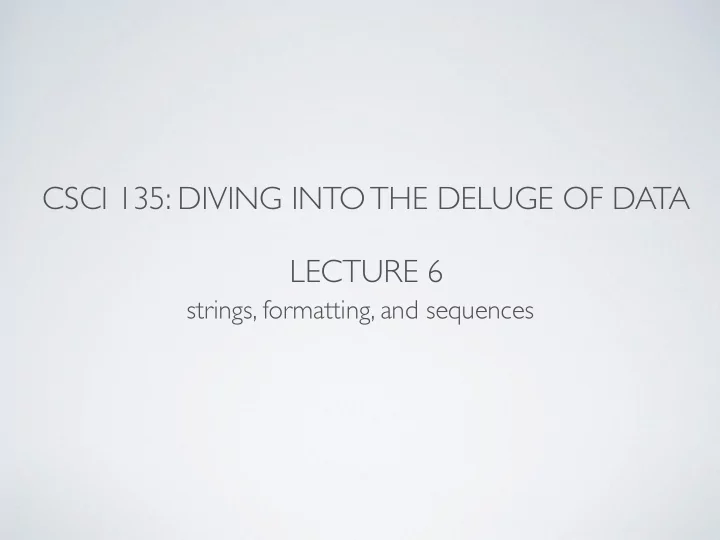

CSCI 135: DIVING INTO THE DELUGE OF DATA LECTURE 6 strings, formatting, and sequences
SEQUENCES • indexing • s[i] = the object at position i • for strings, this yields the character at position i • slicing • s[i:j:k] = yields a sequence of objects in the range s[i] to s[j-1] inclusive by step k • the parameters i , j , and k are optional; for a string s • s[:4] = the prefix of length 4 of s • s[4:] = the suffix of s starting at position 4 • s[:] = a copy of the entire string s • length • len(s) = the length of the sequence s ; for strings this yields the length of the string
s = “brent drove 3.14 miles” s[4] = s[1:5] = s[13:] = s[:5] =
Strings are immutable >>> s = "brent drove 3.14 miles" >>> s[0] = "t" Traceback (most recent call last): File "<stdin>", line 1, in <module> TypeError: 'str' object does not support item assignment
CLASSES AND METHODS Class: Transformer Method: transform optimus = Transformer() optimius.transform() bumble = Transformer() bumble.transform()
METHODS ON STRINGS • split: splits a string into constituent parts based on a separator string parameter • join: joins a list of strings using the string object as its separating character • upper: returns a copy of the string with all characters converted to upper case • lower: returns a copy of the string with all characters converted to upper case • find: given a search string sub , returns the lowest index in the string object where sub occurs.
s = “brent drove 3.14 miles” s.split() s.split(‘d’) “+”.join([‘3’,’45’,’100’,’4’]) ‘’.join(s.split()) s.upper() s.lower() s.find(“drove”) s.find(“e”,3) s.find(“e”,12)
FORMATTING STRINGS >>> "{} drove {} miles".format("Brent", 3.14) 'Brent drove 3.14 miles’ >>> "{dave} drove {ten} miles".format(dave="Brent", ten=3.14) 'Brent drove 3.14 miles' >>> "{1} drove {0} miles".format(3.14, "Brent") 'Brent drove 3.14 miles'
PALINDROMES strings that reads the same forwards and backwards • a dog a plan a canal pagoda • a man a plan a cat a ham a yak a yam a hat a canal panama • amy must I jujitsu my ma
def palindrome (s): n = len (s) for i in range (n): if (s[i] != s[n-1-i]): return False return True
def palindrome (s): n = len (s) for i in range (n//2): if (s[i] != s[n-1-i]): return False return True
def palindrome (s): return (s == s[::-1])
DOUBLE strings that, when cut in half, are the same • brentbrent • pizzapizza • yeahyeah
Recommend
More recommend